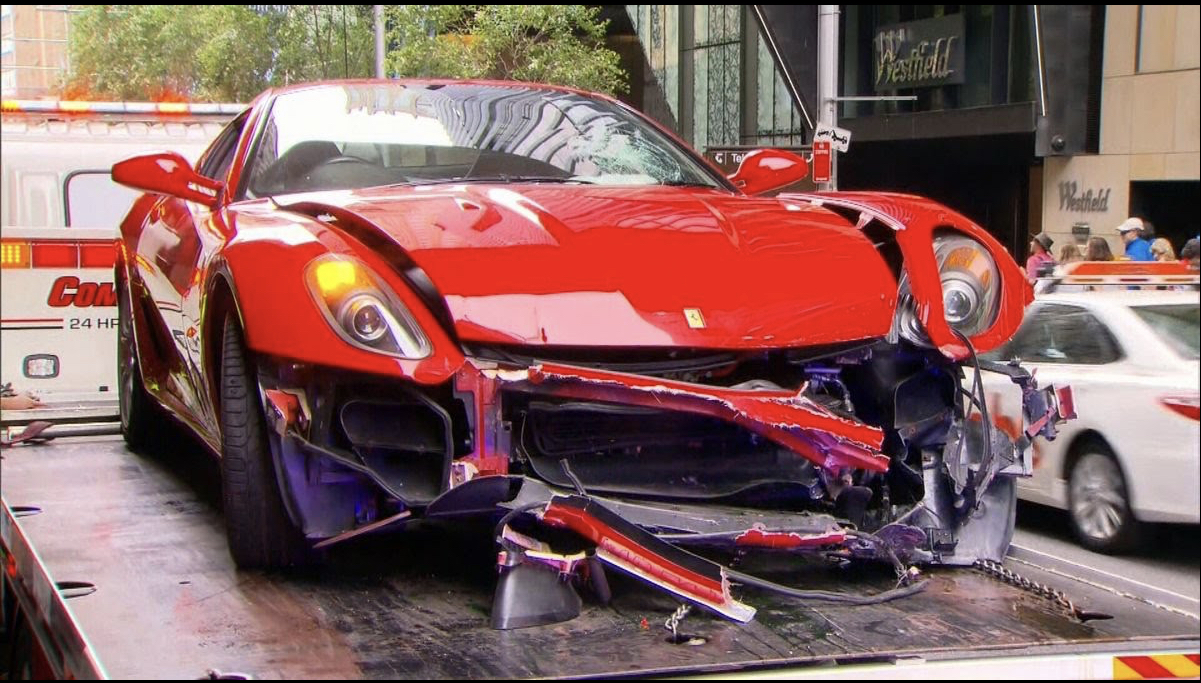Share This Article
Array
It is reported that a 41-year-old man drove a Ferrari worth about $300K in the Sydney CBD before crashing it straight into a jewellery store near David Jones in Sydney CBD- at the corner of Castlereagh and Market Street on Monday.
Unfortunately, a woman in her sixty’s sustained minor injuries and was escorted to St Vincents Hospital as a result of a hip injury.
It’s reported that the woman was a pedestrian who ran away from the path of the vehicle before it collided into the shop.
The man was subsequently taken into custody and charged with, drink driving, driving while suspended and driving in a dangerous manner.
The luxury car was later towed away.
The man allegedly returned a BAC mid-range reading of 0.107.
Is it a crime to Drive with a Mid-range Blood Alcohol Concentration in NSW?
There are generally 6 main types of drink driving offences in NSW, namely, high-range, mid-range, low-range, DUI, special & novice-range drink driving.
Each carry onerous penalties, but this article will be focusing on mid-range drink driving laws in NSW.
In NSW, it’s a crime carrying heavy sentences for driving a motor vehicle with a blood alcohol concentration reading of 0.08 or more, but less than 0.15g concentration of alcohol.
A mid-range drink driving offence carries a criminal record (conviction).
The criminal conviction remains there against your name for at least 10-years after which time it’s considered ‘spent’ if, and only if there’s been no further convictions for an offence carrying a penalty of imprisonment – section 8 Criminal Records Act 1991 (NSW).
Once a conviction is ‘spent’, generally there is no requirement to disclose to it anyone.
The only way to avoid a criminal conviction even after pleading guilty to mid-range drink driving is if the Court imposes a non-conviction sentence, such as section 10 or Conditional Release Order non-conviction penalty.
The ultimate sentence outcome for mid-range drink driving really depends on various factors, including, the police facts (the ‘what, when, where and how’), your traffic record, whether it is your first or second drink driving offence, the BAC reading, your need for a driver licence, the impact of a conviction or disqualification on your job and family dependants.
A further relevant factor in a drink driving sentence is whether or not you have participated and completed the traffic offender program following a drink driving offence.
Section 110(4) Road Transport Act 2013 (NSW) prescribes the maximum penalties for mid-range drink driving in NSW.
If this is your first mid-range drink driving offence, the maximum penalties includes:
- Imprisonment of 9-months
- $2,200 fine
- Criminal conviction; and
- Compulsory licence disqualification period between 3 – 6 months, with a 1-year minimum interlock device period thereafter (if exempt from the interlock program, the automatic disqualification is 1-year or minimum 6 months).
If this is your second or subsequent mid-range drink driving offence, the maximum penalties include:
- Imprisonment of 12-months
- $3,300 fine
- Criminal conviction
- Compulsory licence disqualification period of between 6 – 9 months, with a 2-year minimum interlock device period thereafter (if exempt from the interlock program, the automatic disqualification is 3-years or minimum 1 year).
It’s considered a second or subsequent offence if you’ve been convicted of a ‘major offence’ (i.e. drink driving) over the last 5-years from the date of your current drink driving conviction in court.
Section 212 Road Transport Act 2013 (NSW) outlines the circumstances in which you can apply to the court to be exempt from having to participate in the interlock device program, which normally apply to first or second-time mid-range drink drivers in NSW.
Click here to view a table that outlines the defences to drink driving in NSW.
Some of these defences include, the at-home defence, two-hour defence, the pharmacologist defence, and mistake of fact defence.
Upon being charged for mid-range drink driving by police, the police will normally also issue you with an immediate suspension notice which effectively suspends you from driving immediately.
The period of time you have spent suspended by the time you are sentenced will be taken into account in the court ordered disqualification period- which effectively backdates the disqualification period.
If you end up getting a section 10 or conditional release order without conviction for mid-range drink driving as a sentence, you will not be disqualified from driving.
Want to know more?
Call our friendly team of drink driving lawyers in Sydney to arrange a free consultation over the phone or in one of our conveniently located offices across NSW.
Book a Lawyer Online
Make a booking to arrange a free consult today.
Call For Free Consultation
Call Now to Speak To a Criminal Defence Lawyer
Over 40 Years Combined Experience
Proven SuccessAustralia-Wide
Experienced LawyerGuarantee
 (02) 8606 2218
(02) 8606 2218
 (02) 8606 2218
(02) 8606 2218















